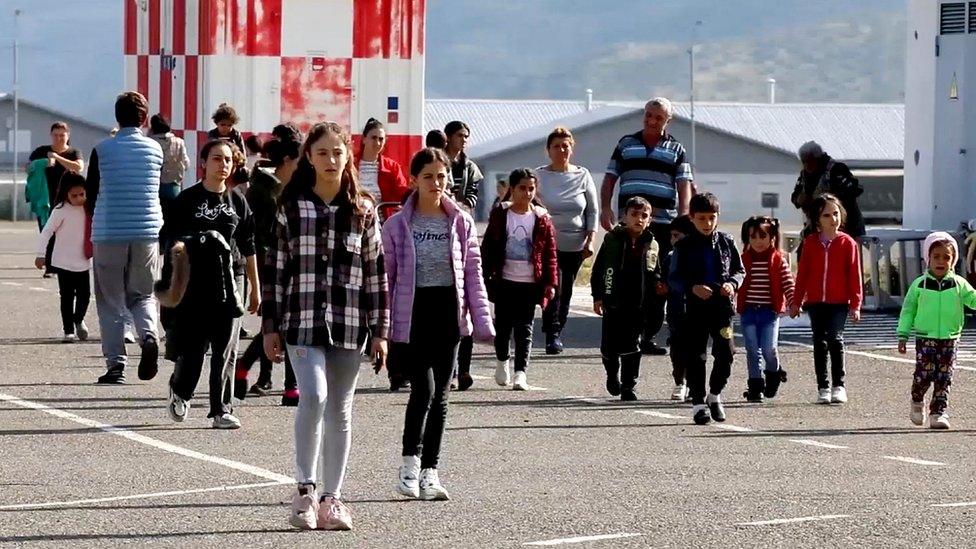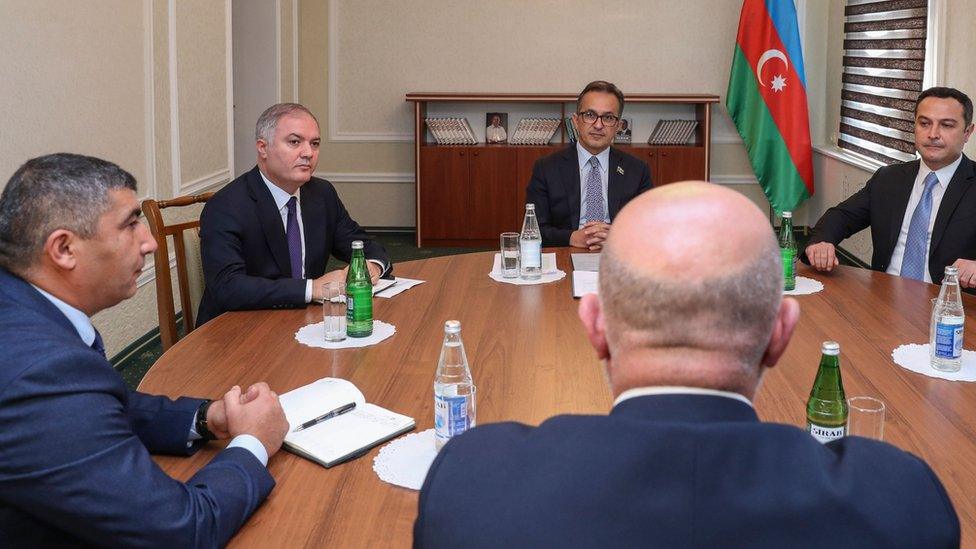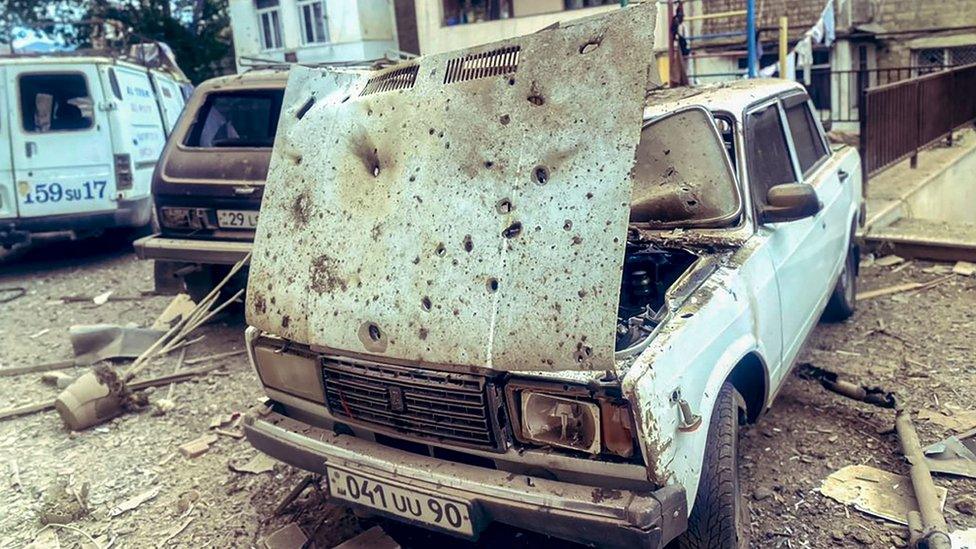Armenia ready for 40,000 families after Nagorno-Karabakh surrender
- Published

Thousands of ethnic-Armenian civilians are hoping to be evacuated after the surrender
Armenia is ready to host people displaced from the breakaway region of Nagorno-Karabakh after its surrender to Azerbaijani forces, Prime Minister Nikol Pashinyan has said.
He said accommodation had been prepared for tens of thousands of people, although he saw "no direct threat" to Karabakh's ethnic Armenians.
Karabakh authorities have warned the population could face ethnic cleansing.
But Azerbaijan said it was seeking a "peaceful reintegration" of the region.
Ethnic-Armenian forces in Karabakh agreed a ceasefire with Azerbaijan on Wednesday after 24 hours of intense fighting.
Under the terms of the Russian-brokered truce, local Karabakh forces committed to being completely disbanded as well as disarmed.
Karabakh's human rights ombudsman, Gegham Stepanyan, said on social media that the streets of the capital Khankendi, known as Stepanakert by Armenians were "filled with displaced people, hungry, scared, and in uncertainty".
In a televised speech, the Armenian prime minister said the region's estimated 120,000 ethnic Armenians should be allowed to stay "in their homes in dignified and safe conditions".
But his country had started preparing for a possible influx of refugees when fighting erupted and was ready to take in as many as 40,000 families, Mr Pashinyan said.
More than 10,000 people had made their way to the airport in Khankendi on Wednesday with the hope of being evacuated, he added. The airport is adjacent to a Russian peacekeeping base.
Local forces in Nagorno-Karabakh earlier accused Azerbaijan's military earlier of breaking the truce. Social media footage showed people in Khankendi running for cover and what sounded like small-arms fire could be heard in the background.
Azerbaijan's defence ministry was quick to reject reports of a resumption in fighting as "completely false".
Mr Pashinyan also said the ceasefire was holding and denied reports that Azerbaijan's military had entered the regional capital.
Meanwhile, ethnic-Armenian and Azerbaijani delegations met in the town of Yevlakh, some 100km (60 miles) north of Khankendi, to discuss Nagorno-Karabakh's future.
Pictures on Azerbaijani state media showed the two delegations seated with members of Russia's peacekeeping mission.
After several hours, the Azerbaijani presidential office said in a statement that the negotiations had concluded and that fuel, medical supplies and humanitarian aid would be sent to to Nagorno-Karabakh.
It described the talks as "constructive and positive", but the country's representative also said it was difficult to expect all problems between Azerbaijan and Karabakh Armenians to be resolved in one session, Russia's Ria news agency reported.
A follow-up meeting is expected in the near future.

Azerbaijani and ethnic-Armenian representatives have started to discuss Nagorno-Karabakh's future
Nagorno-Karabakh has been isolated since Azerbaijan effectively blockaded the only route connecting the enclave to Armenia in December 2022.
Russia said its peacekeepers had evacuated 5,000 people from dangerous areas since the offensive had begun, Interfax news agency reported.
The breakaway region in the South Caucasus is internationally recognised as part of Azerbaijan and the government in Baku has made clear it intends to take full control of it.
Azerbaijan's president, Ilham Aliyev, hailed the ceasefire agreement as a major victory, declaring that his country had restored its sovereignty over the territory for the first time in decades.
But ethnic Armenians fear that Azerbaijan taking control could lead to ethnic cleansing and Karabakh Armenians being forced to flee.
An adviser to the Karabakh authorities, Davit Babayan, told Reuters his people could not be left to die and that security guarantees were needed before local forces would hand over their weapons.
President Aliyev said his country had nothing against the population, only their "criminal junta".
The UN Security Council was due to discuss Nagorno-Karabakh later on Thursday.
Weakened by the months-long blockade and without significant international support, Karabakh's forces saw Azerbaijan make quick territorial gains after it launched its military operation on Tuesday.
Karabakh authorities have reported casualty figures of several hundred killed and wounded. The BBC has not been able to verify these figures, and independent observers have been unable to reach the region since the blockade started.
Five Russian peacekeepers were mistakenly killed during the Azerbaijani offensive, prosecutors in Baku say. Russian reports said they included the mission's deputy commander, Ivan Kovgan. A sixth Russian was killed in an Armenian attack, the prosecutors say.
President Aliyev expressed his condolences and told Vladimir Putin an investigation into their deaths would be carried out, the Kremlin said.
Ethnic Armenians have controlled Karabakh since a bloody war following the collapse of the Soviet Union. Violence has erupted repeatedly over the years, including during the last major escalation in 2020 when Azerbaijan recaptured territory in a six-week war.
There were clashes between police and demonstrators in the Armenian capital, Yerevan, on Wednesday, as thousands demanded the resignation of Prime Minister Nikol Pashinyan.
Armenia-Azerbaijan: Nagorno-Karabakh map

Related topics
- Published28 September 2023
